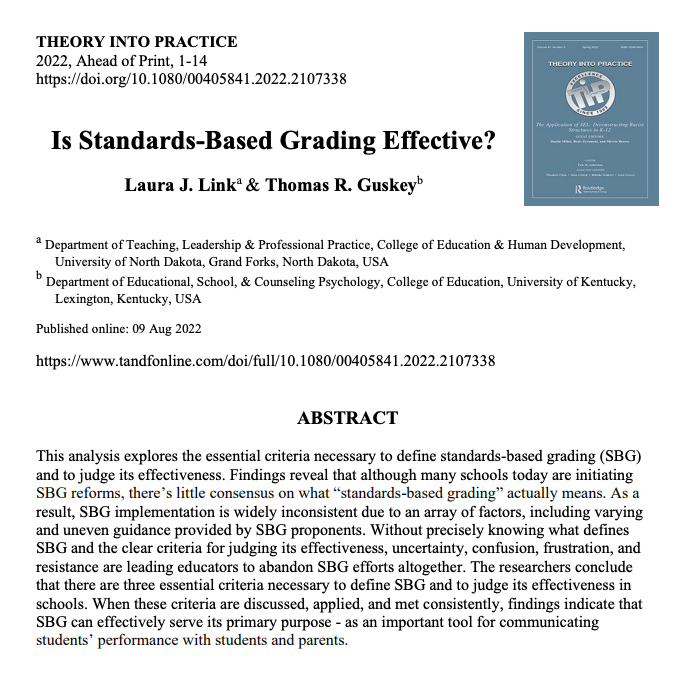
T. Guskey is one of my favorite grading authors/thinkers/researchers. His advice is clear, backed up by research, and useful for teachers. So I got interested when I saw that he co-authored a paper about standards based grading: Is Standards-Based Grading Effective?
In this article, Guskey and Link address several important topics about standards based grading (SBG) including:
- What is Standards Based Grading? Their 3 essential criteria make sense to me. SBG = reporting on specific standards rather than a single course grade, reporting using a limited # of performance categories (rather than a % scale), and reporting academic achievement separate from behavioral categories.
- Does SBG improve achievement? Love this quote:”No grading system by itself improves student learning.” but “better grading can provide clearer and more accurate information on students’ learning that can then be used as a basis for making improvements.” pg. 3
- What does SBG say about classroom assessment practices? They include great reminders that classroom assessments always need to be aligned well with instruction, in SBG and non-SBG contexts. I like the distinction they make between SBG and some more general grading practices and advice that some people associate with SBG.
One specific pieces of advice in the article contradicted something I thought I knew: I suspected that if a school/district wanted to move towards SBG, they need to change their report card format at the same time. My thinking was that there needed to be a place to report standards based grades in a clear way, and that meant that schools/districts needed to change the report card format from a traditional A-F percentage based report card to a more standards based report card.
Guskey and Link directly challenge my assumption! “Although seemingly counterintuitive, reporting practices should be the last thing to change with SBG… teachers cannot report on standards until everything else aligns with them… the curricular, instructional and assessment practices used to generate these grades must be clearly addressed alongside grading and reporting policies to affect student performance. Problems arise when educators change grading practices and move ahead with SBG and reporting without addressing the critical components of curriculum, instruction, and assessment first.” (pg. 5)
So I need to keep thinking about this! When I talk with teachers who are interested in SBG, our conversations will be more about “addressing the critical components of curriculum, instruction, and assessment first,” rather than worrying about limitations of the current report card format!